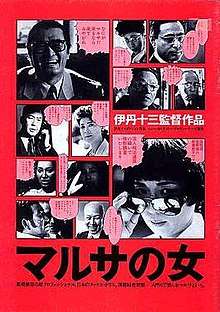A Taxing Woman
A Taxing Woman (マルサの女, Marusa no onna)[lower-alpha 1] is a 1987 Japanese film written and directed by Juzo Itami.[1] It won numerous awards, including six major Japanese Academy awards.[2]
| A Taxing Woman | |
|---|---|
 Theatrical poster for A Taxing Woman (1987) | |
| Directed by | Juzo Itami |
| Produced by | Seigo Hosogoe Yasushi Tamaoki |
| Written by | Juzo Itami |
| Starring | Nobuko Miyamoto Tsutomu Yamazaki Masahiko Tsugawa Keiju Kobayashi Mariko Okada |
| Music by | Toshiyuki Honda |
| Cinematography | Yonezo Maeda |
| Edited by | Akira Suzuki |
| Distributed by | Toho |
Release date | February 7, 1987 |
Running time | 127 min. |
| Country | Japan |
| Language | Japanese |
The title character of the film, played by Nobuko Miyamoto, is a tax investigator for the Japanese National Tax Agency[3] who employs various techniques to catch tax evaders.
The director reportedly was inspired to make the film after he entered a much higher tax bracket after his success with The Funeral.
A sequel, A Taxing Woman 2, featuring some of the same characters but darker in tone, was released in 1988.
Plot
A female tax auditor, Ryōko Itakura, inspects the accounts of various Japanese companies, uncovering hidden incomes and recovering unpaid taxes.
One day she persuades her boss to let her investigate the owner of a string of love hotels who seems to be avoiding tax, but after an investigation no evidence is found. During the investigation the inspector and the inspected owner, Hideki Gondō, develop an unspoken respect for each other.
She is promoted to the post of government tax inspector. When the same case reappears she is again allowed to investigate. During a sophisticated series of raids against the hotel owner's interests, she accidentally comes across a hidden room containing vital incriminating evidence. On the same day, she helps Gondō with his relationship with his teenage son. While she is doing all of this, she is neglecting her own son at home, calling him from her office at night and saying, "You can heat up your own dumplings in the microwave! You are big now! You are five!"
Six months later the two meet again. The man is tired after daily interrogations. She tries to persuade him to surrender his last secrets for the sake of his son. After she declines an offer to live with him, he cuts his finger and writes the name of the secret bank account in blood on a handkerchief of hers that he saved from the first time she investigated him.
Cast
- Nobuko Miyamoto: Ryōko Itakura
- Tsutomu Yamazaki: Hideki Gondō
- Masahiko Tsugawa: Hanamura
- Yasuo Daichi: Ijūin
- Kinzoh Sakura: Kaneko
- Hajime Asō: Himeda
- Kiriko Shimizu: Kazue Kenmochi
- Kazuyo Matsui: Kumi Torikai
- Hideo Murota: Jūkichi Ishii
- Machiko Watanabe: Nurse
- Shōtarō Takeuchi: Rihei Hakamada
- Mitsuhiko Kiyohisa: Chauffeur of Gondō
- Akira Shioji: Realtor
- Kōichi Ueda: Ninagawa's confidant
- Yūsuke Nagumo: Ninagawa's henchman
- Shirō Itō :
- Keiju Kobayashi: Boss
Video game
An eponymous visual novel video game was published by Capcom for the Family Computer in 1989. The game is notorious for the great visuals.
Notes
- Marusa (マルサ) is slang for the tax inspection division (査察部, sasatsubu) of the National Tax Agency, which uses a 査 in a circle (visually a seal) as their symbol. Reading this as a Japanese rebus monogram yields 〇査 = maru + sa.
References
- Infobox data from マルサの女 (in Japanese). Japanese Movie Database. Retrieved 2009-05-12. and Marusa no onna (1987) on IMDb
- "Awards for Marusa no onna (1987)" (in Japanese). Internet Movie Database. Retrieved 2009-05-05.
- Erickson, Hal. "Marusa no onna (A Taxing Woman) (1987)". Rotten Tomatoes Movie Review. Retrieved 2012-08-23.
External links
- Marusa no onna (1987) on IMDb
- マルサの女 (in Japanese). Japanese Movie Database. Retrieved 2009-05-12.
- "MARUSA NO ONNA". Complete Index to World Film. Retrieved 2009-05-12.
- マルサの女 (in Japanese). walkerplus.com. Archived from the original on 2005-08-24. Retrieved 2009-05-12.
- マルサの女(1987) (in Japanese). allcinema.net]. Retrieved 2009-05-08.
- マルサの女. Variety Japan (in Japanese). Retrieved 2009-05-12.
- A Taxing Woman at Rotten Tomatoes